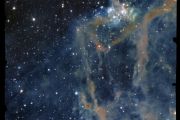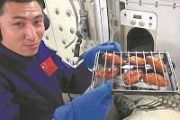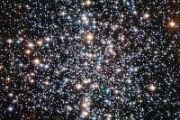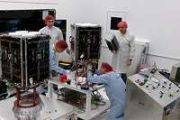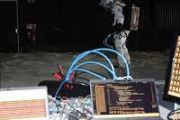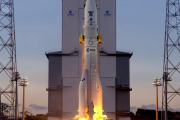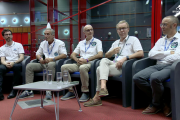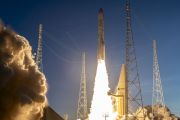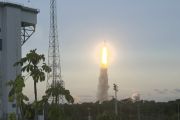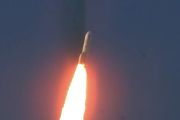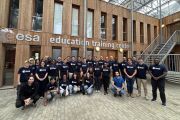
Copernical Team
Asteroid sample brought back to Earth gets a close-up look at Brown
 In December 2020, Japan's Hayabusa2 spacecraft swung by Earth to drop off a cache of rock samples taken from a near-Earth asteroid called Ryugu. Asteroids like Ryugu are thought to represent the ancient building blocks of the solar system, and scientists have been eager to get a closer look at the returned samples.
Last week, the Japanese Aerospace Exploration Agency shipped one of the sam
In December 2020, Japan's Hayabusa2 spacecraft swung by Earth to drop off a cache of rock samples taken from a near-Earth asteroid called Ryugu. Asteroids like Ryugu are thought to represent the ancient building blocks of the solar system, and scientists have been eager to get a closer look at the returned samples.
Last week, the Japanese Aerospace Exploration Agency shipped one of the sam Soyuz docks to new Nauka module port at ISS
 The Soyuz MS-18 spacecraft that first launched and arrived to the International Space Station April 9 has now successfully relocated with its crew aboard from the station's Earth-facing Rassvet module to the "Nauka" Multipurpose Laboratory Module. The spacecraft carrying Russian cosmonauts Oleg Novitskiy, commander of the Soyuz, and Pyotr Dubrov along with NASA astronaut Mark Vande Hei, docked a
The Soyuz MS-18 spacecraft that first launched and arrived to the International Space Station April 9 has now successfully relocated with its crew aboard from the station's Earth-facing Rassvet module to the "Nauka" Multipurpose Laboratory Module. The spacecraft carrying Russian cosmonauts Oleg Novitskiy, commander of the Soyuz, and Pyotr Dubrov along with NASA astronaut Mark Vande Hei, docked a Spin test a success, but Ingenuity Flight 14 delayed until after conjunction
 It's been an eventful several Martian days, or sols, since our last blog post, so we wanted to provide everyone with an update on where things stand on Mars. In our last post, we explained that we were getting ready to begin flying with a higher rotor speed to compensate for decreasing atmospheric density caused by seasonal changes on Mars.
Increasing the rotor speed is a significant chang
It's been an eventful several Martian days, or sols, since our last blog post, so we wanted to provide everyone with an update on where things stand on Mars. In our last post, we explained that we were getting ready to begin flying with a higher rotor speed to compensate for decreasing atmospheric density caused by seasonal changes on Mars.
Increasing the rotor speed is a significant chang Bare Super-Earths offer clues to evolution of hot atmospheres
 A group of astronomers from the Astrobiology Center, the National Astronomical Observatory of Japan, the University of Tokyo, and other institutes, discovered two rocky super-Earth exoplanets lacking thick primordial atmospheres in very close orbits around two different red dwarf stars. These planets provide a chance to investigate the evolution of the atmospheres of hot rocky planets.
In
A group of astronomers from the Astrobiology Center, the National Astronomical Observatory of Japan, the University of Tokyo, and other institutes, discovered two rocky super-Earth exoplanets lacking thick primordial atmospheres in very close orbits around two different red dwarf stars. These planets provide a chance to investigate the evolution of the atmospheres of hot rocky planets.
In MDA releases first details of its next generation commercial earth observation mission
 MDA Ltd has released new details about its next industry leading Earth observation (EO) mission. Leveraging legendary RADARSAT heritage, the new system will include a large C-band Synthetic Aperture Radar (SAR) satellite operating in a mid-inclination orbit. Capable of covering a 700 km swath in a single pass, the new system will provide the broadest area coverage on the market, changing how, wh
MDA Ltd has released new details about its next industry leading Earth observation (EO) mission. Leveraging legendary RADARSAT heritage, the new system will include a large C-band Synthetic Aperture Radar (SAR) satellite operating in a mid-inclination orbit. Capable of covering a 700 km swath in a single pass, the new system will provide the broadest area coverage on the market, changing how, wh China opens Shenzhou-12 return capsule at ceremony
 China held a ceremony Monday to open the capsule of the Shenzhou-12 spacecraft which carried three astronauts back to Earth on Sept. 17.
Space officials, including Hao Chun, director of the China Manned Space Agency, and China's first astronaut Yang Liwei handed over the items taken out of the capsule to various representatives.
Hao said that the Shenzhou-12 crewed mission included m
China held a ceremony Monday to open the capsule of the Shenzhou-12 spacecraft which carried three astronauts back to Earth on Sept. 17.
Space officials, including Hao Chun, director of the China Manned Space Agency, and China's first astronaut Yang Liwei handed over the items taken out of the capsule to various representatives.
Hao said that the Shenzhou-12 crewed mission included m SpaceX CRS-23 Dragon returns experiments on brain, muscles, liver to Earth
 The 23rd SpaceX commercial resupply services mission returns samples from scientific experiments on the International Space Station. Back on Earth, scientists anticipate quick access to their experiments for additional observations and analyses.
Dragon undocks from the space station Sept. 30 and is scheduled for splashdown near NASA's Kennedy Space Center in Florida hours later.
b>T
The 23rd SpaceX commercial resupply services mission returns samples from scientific experiments on the International Space Station. Back on Earth, scientists anticipate quick access to their experiments for additional observations and analyses.
Dragon undocks from the space station Sept. 30 and is scheduled for splashdown near NASA's Kennedy Space Center in Florida hours later.
b>T Global missile defense from space got more affordable
 The Defense Department hopes, within the decade, to have a meshed network of low Earth orbit satellites - linked together and to warfighters - providing real-time global awareness of missile threats and the ability to respond.
However, that goal was once considered cost prohibitive, said the director of the Space Development Agency.
Derek M. Tournear participated in a Defense One vir
The Defense Department hopes, within the decade, to have a meshed network of low Earth orbit satellites - linked together and to warfighters - providing real-time global awareness of missile threats and the ability to respond.
However, that goal was once considered cost prohibitive, said the director of the Space Development Agency.
Derek M. Tournear participated in a Defense One vir Ariane 6 launch complex inaugurated at Europe's Spaceport
 The new launch complex built for Europe's upcoming Ariane 6 rocket is inaugurated at Europe's Spaceport in French Guiana.
With this, ESA celebrates another important milestone in the Ariane 6 roadmap as it forges ahead with combined tests between launch vehicle and launch base and preparations towards the first launch campaign.
Clearly visible from space, the facilities feature remar
The new launch complex built for Europe's upcoming Ariane 6 rocket is inaugurated at Europe's Spaceport in French Guiana.
With this, ESA celebrates another important milestone in the Ariane 6 roadmap as it forges ahead with combined tests between launch vehicle and launch base and preparations towards the first launch campaign.
Clearly visible from space, the facilities feature remar Lucy mission prepares for launch to Trojan asteroids
 NASA has tested the functions of Lucy, the agency's first spacecraft to study Jupiter's Trojan asteroids, filled it with fuel, and is preparing to pack it into a capsule for launch Saturday, Oct. 16.
Named after characters in Greek mythology, these asteroids circle the Sun in two swarms, with one group leading ahead of Jupiter in its path, the other trailing behind it. Lucy will be the fir
NASA has tested the functions of Lucy, the agency's first spacecraft to study Jupiter's Trojan asteroids, filled it with fuel, and is preparing to pack it into a capsule for launch Saturday, Oct. 16.
Named after characters in Greek mythology, these asteroids circle the Sun in two swarms, with one group leading ahead of Jupiter in its path, the other trailing behind it. Lucy will be the fir 








